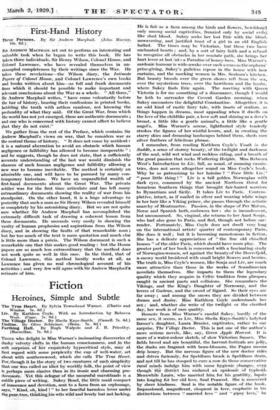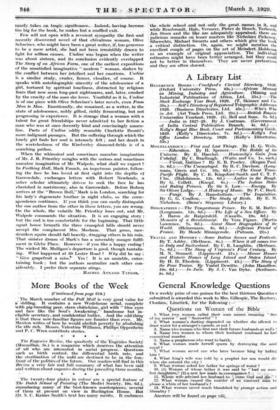Fiction
Heroines, Simple and Subtle
Farthing Hall. By Hugh Walpole and J. B. Priestley. (Macmillan. 7s. 6d.)
THOSE who delight in Miss Warner's insinuating discoveries of dusky velvety clefts in the human consciousness, and in the soft surprises of her exquisitely hypocritical style, may Si first regard with some perplexity the cup of well-water, set about with southernwood, which she calls The True Heart.
For, though it be the story_ of creattires of such simplicity that one was called an idiot by worldly folk, the point of view is perhaps more elusive than in its ironic and charming pre, decessors. Yet this eclogue of the mournful marshlands is a subtle piece of writing. Sukey Bond, the little maid compact of innocence and devotion, sent to a farm from an orphanage, says; " Kind, oh, kind ! " to her fanciful harmless lover uncle the pear.teee, thiukinjghis-wits wild and lovely but not lacking. He is fair as a faun among the birds and flowers, beillderi4 only among social captivities, frenzied only by social evilst like shed blood. Sukey seeks her lost Eric with the blind, unwavering, and justified trust of a girl in an old English ballad. The times may be Victorian, but these two have enchanted hearts ; and, by a sort of fairy faith and a refusal to recognize all obstacles in her resolute path, she brings het hurt lover at last int) a Paradise-of honey-bees. Miss Warner's sardonic humour is wide-awake over such scenes as the orphans. prize-giving, Sukey's guileless repose in the house with lace• curtains, and the mocking women in Mrs. Seaborn's kitchen. But beauty broods over the green shores reft from the sea, over the mysterious trees, over the hawthorn and the lambs, where Sukey finds Eric again. The meeting with Queen Victoria is for me something of a dissonance, though I would be loth to surrender the Covent Garden morning, when Sukey encounters the delightful Constantine. Altogether, it is an odd kind of rustic fairy tale, with insets of realism, as things happen in dreams, most appealing when it dwells on the love of the childlike pair, a love soft and shining as a dove's breast, a little like a gentle animal's, a little like a gentle angel's. Miss Warner's serene, lightfooted style tenderly strokes the figures of her wistful lovers, and, in creating the starry skies and dreaming landscapes behind them, sheds rare silver feathers of felicitous phrase.
I remember, from reading Kathleen Coyle's Youth in the Saddle, a sense of stormy beauty, of the twilight and darkness of the soul, wild wet wind and reckless riding, and a breath of the great passion that rocks Wuthering Heights. Miss Rebecca. West's Introduction to Liv, full, as usual, of amusing casuis. tries, does not seem altogether sound on Miss Coyle's book. Why be so patronizing to her heroine ? " Poor little Liv," " poor little thing ! " Liv is a tall golden NOrwegian with dark eyes, consumed by the ancient Northern thirst for, luxurious Southern things that brotight fair-haired warriors to Byzantium and Sicily. It takes Liv to Paris. Contem- plative, intact, as if mailed in silver and wearing white wings in her hair like a Viking prince, she passes through the artistic anarchy of Montmartre. Passion, in the shape of Per Malom, Norse and Spanish both, embraces her : she is incandescent, but unconsumed. So, virginal, she returns to her Aunt Sonja, who had also gone to Paris, and fled, though not before sur-. render. Fortunately, Miss Coyle does not dwell very long on the international artists' quarter of contemporary Paris. She does it well ; but it is becoming monotonous in fiction. She has a delicate appreciation of " the fine old chiselled houses " of the older Paris, which should have more play. The greater part of her book is concerned with a fascinating study of Norwegian women, set against the beauty of the Dovrefjeld, a snowy world broidered with small bright flowers and berries. The truth is, Miss Coyle's women, like Sonja and Liv, are much more attractive than those in the works of Scandinavian novelists themselves. She imparts to them the legendary quality which they acquire in Celtic tradition from glimpses caught in ancient pacts and collisions. She remembers the Wrings, and the King's Daughter of Norroway, and the lovers of Gudrun, and the sword of Sigurd. So their eyes are far away ; and among the snows they are divided between dream. and desire: Miss Kathleen Coyle understands her sex ; and, whether she write of the twilight or the clarified day, her work is of rare quality.
Remote from Miss Warner's candid Sukey, hardly of the same sex, it seems, as Liv, Miss Sheila Kaye-Smith's ladyfled farmer's daughter, Laura Brazier, captivates, rather to our surprise, The Village Doctor. This is not one of the author's more serious novels, -like, say, Green Apple Harvest. It is more of a water-colour sketch, of slow Victorian Sussex. The fields brood and are bountiful, the harvest-festivals. are jolly-, the dusks are fragrant with bean-blossom, the Pagan moons drip honey. But the nervous figure of the new doctor rides and drives furiously, for Speldham brook is Speldham drain, and not till he has stooped to cure a cow, do those conservative rural 'minds indulge him with borne hygienic changes, even though thedistrict MIS endured ic epidem of typhoid. Meanwhile Latin; who married him, for his gentility, lapses into longing for her old love, Saul Peascod. She is recovered by sheer kindness. Saul is the notable figure.of.the book. Impassioned, magnificent, eloquent in love, emphatic in his distinctions between married love " and " gipsy love,- he
nearly. takes :ow tragic. significance.. - -Indeed: -having- become- too big for the book, he makes but a muffled exit.
Few will not open with a reverent sympathy the first and recently discovered novel- of that chivalrous woman, Olive Sehreiner, who might have been a great writer, if, too generous to be a mere artist, she had not been irresistibly drawn to fight for selfless causes. Undine was. begun when the writer was about sixteen, and its conclusion evidently overlapped The Story of an African Farm, one of the earliest expositions of the unsatisfied imaginative " modern " woman, shaken by the conflict between her intellect and her emotions. Undine is a similar study, cruder, fiercer, cloudier, of course. It speaks with autobiographic sincerity of the adolescence of a girl, tortured by spiritual loneliness, distracted by religious fears that now seem long-past nightmares, and, later, crushed by the cruelty of the man she loves. Youthful as it is, Undine is of one piece with Olive Schreiner's later novels, even From Man to Man. Emotionally, she remained, as a writer, in the state of adolescence, nobly gifted, richly fermenting, but not progressing in experience. It is strange that a woman with a talent for great friendships never admitted to her fiction a man who was at once decently kind and convincingly mascu- line. Parts of Undine oddly resemble Charlotte Bronte's more indignant passages. But the suffering through which the lonely girl finds her soul is intensely felt ; and her death in the wretchedness of the Kimberley diamond-fields is of a searching pathos.
When the whimsical and sometimes macabre imagination of Mr. J. B. Priestley mingles with the serious and. sometimes macabre imagination of Mr. Walpole, what shall we expect ? In Farthing flail, Mark French, an impetuous painter, follow- ing the face he has loved at first sight into the depths of Garrowdale, exchanges letters with Robert Newlands, a sober scholar ultimately driven to seek the face he has cherished in matrimony, also in Garrowdale. Before Robert arrives at the "Brown Bull," Mark is in London, searching for his lady's degenerate brother in night clubs, so the corre- spondence continues. If you think you can easily distinguish the one author from the other in these letters, you are wrong. On the whole, the volatile Mr. Priestley loses out, and Mr. Walpole commands the situation. It is an engaging story ;
but the end is too comfortable for the beginning. That little . _
squat house beneath the three crumpled hills should never accept the complacent Mrs. Masham. That gross, race, drunken squire should fall heavily, dragging others in his ruin. That sinister dream of Mark's has a miserably meagre fulfil- ment in Glebe Place. However-if you like a happy ending I The wicked Mr. Mulligan's departure is good, though tantaliz- ing. What happened at 89 Lester Road ? Why did he say " Give grapefruit a miss!' Yes ! It is an amiable, enter-, taming book ; but the authors neutralize each other con-.
siderably. I prefer their separate stings. : RACHEL XNNAND TAYLOR.

























































 Previous page
Previous page